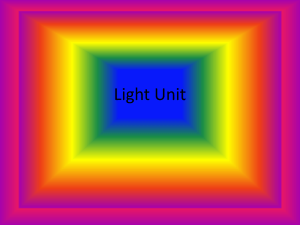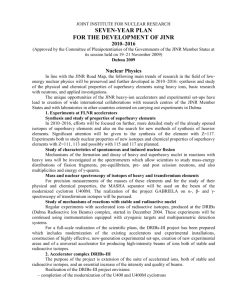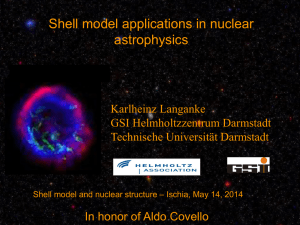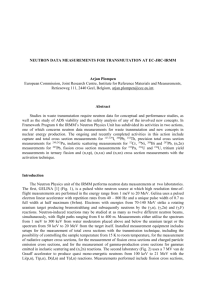LBNL, USA - IAEA Nuclear Data Services
advertisement
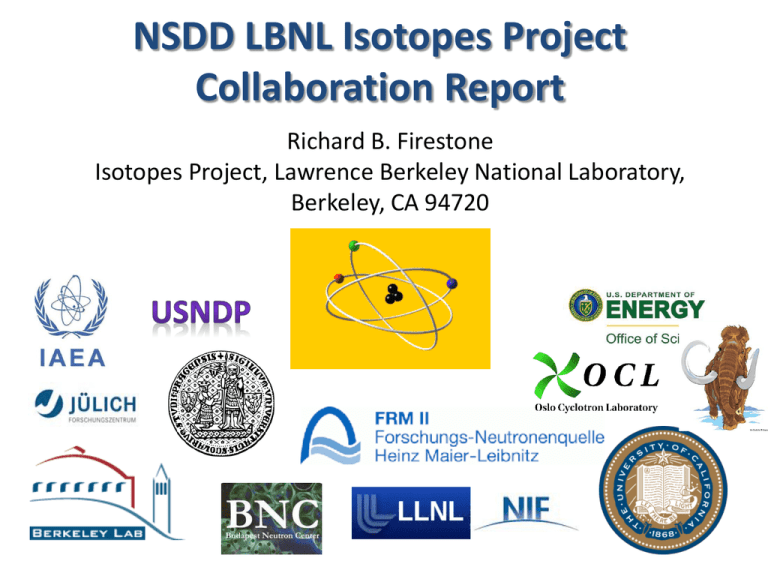
NSDD LBNL Isotopes Project Collaboration Report Richard B. Firestone Isotopes Project, Lawrence Berkeley National Laboratory, Berkeley, CA 94720 Isotopes Project Group Members Richard B. Firestone – Group Leader Coral Baglin – Staff scientist Shamsu Basunia – Staff scientist Aaron Hurst – Staff scientist Edgardo Browne – Emeritus staff scientist Andrew Rogers – Postdoc Isotope Project Collaborators LLNL/LBNL ENDF g-ray Library – B. Sleaford, N. Summers, J. Escher LLNL National Ignition Facility – L. Bernstein UC Berkeley Nuclear Engineering – K. van Bibber, K.-N. Leung Budapest Reactor – T. Belgya, L. Szentmiklosi Garching FRM-II Reactor – Zs. Revay, P. Kudejova Charles University, Prague – M. Krticka, F. Becvar YD Impact – A. West, J. Kennett, T. Bunch, J. Hagstrum, …….. Evaluation of Particle/g-ray Continuum Data – S. Siem, M. Guttormsen, A.-C. Larsen (Oslo Cyclotron) TransActinide Nuclear Data Evaluation and Measurement (TANDEM) – M. Rossbach, C. Genreith (Jülich Forschungszentrum) Isotopes Project Activities Evaluated Gamma-ray Activation File (EGAF) 1. Neutron capture g-ray cross sections, sg 2. Thermal neutron cross sections, s0 3. Activation data – Pg, sg 4. Neutron separation energies, Sn 5. RIPL nuclear structure data – Adopted Levels IAEA/LBNL website - http://www-nds.iaea.org/pgaa/ Mass Chain Evaluation - A=21-30 Cross Section Measurements 1. Thermal neutron beams – FRM II (Munich), Budapest 2. UC Berkeley neutron generator facility 3. LLNL National Ignition Facility (NIF) 4. MeV Neutron Beams – LBNL cyclotron 5. Surrogate reactions – STARS/LiBeRACE 6. Astrophysics, asteroid impact events, climate change Statistical Model Calculations – DICEBOX (Charles Univ. Prague) Isotopes Project Data Evaluations EGAF evaluation – reported later in this meeting Mass chain evaluation • A=27, Nuclear Data Sheets 112, 1875-1948 (2011) • A=29, Nuclear Data Sheets 113, 909-972 (2012) • A=92, Nuclear Data Sheets 113, 2187-2389 (2012) • A=93, Nuclear Data Sheets 112, 1163-1389 (2011) • A=99, Nuclear Data Sheets 112, 275-446 (2011)* • A=143, Nuclear Data Sheets 113, 715-908 (2012)* • A=192, Nuclear Data Sheets 113, 1871-2111 (2012) • A=220, Nuclear Data Sheets 112, 1115-1161 (2011)* • A=230, Nuclear Data Sheets 113, 2113-2185 (2012)* • A=245, Nuclear Data Sheets 112, 447-494 (2011)* • A=246, Nuclear Data Sheets 112, 1833-1873 (2011)* *Evaluation supported by the NNDC Thermal Neutron Measurements Budapest Reactor and neutron guide hall. The PGAA (capture gamma) station is located 30 m from the reactor wall. 5×107 n/cm2s Compton suppressed HPGe detector. Resolution: <1% for E=0.5-6 MeV, <3% 0.05-0.5 MeV and >6 MeV. FRM II (Garching) - 6×1010 n/cm2s Thermal Neutron Measurements Internal calibration of g-ray cross sections (sg) using stoichiometric compounds or mixtures containing standards, e.g. H, N, Cl, S, Na, Ti, Au. Budapest measurement - enriched isotopes 151,153Eu, 155,157Gd, 182,183,184,185W FRM II (Garching) measurements – YD Impact samples Approved measurements FY2013 – 70,72,73,74,76Ge, 90,91,92,94,96Zr, 238U Younger Dryas Impact samples (geology) UC Berkeley Neutron Generator Laboratory 5×1011 n/s D+D neutron generator is being installed at Etcheverry Hall on the UC Berkeley campus. On-line summer 2013 • 1010 n/cm2s at the target area • Built by NSF for Ar-Ar dating • Available for 2.5 MeV cross section measurement Neutron Beams at the 88” Cyclotron The facility can supply a tunable, monoenergetic neutron beams in the range of 8-33 MeV, up to >108 n/cm2s, by deuteron break up. 5-10 m flight path. Flux is 100× WNR 60R flux at these energies. First experiment 10/7/2012 (LLNL/LBNL) X(d,n) Beam profile from different scintillator positions. R=12 cm for 7 m flight path. Retuning cyclotron eliminated double peak giving 1 ns fwhm timing. 6×108 n/s·cm2, Be target,, 10 mA. Activation measurements National Ignition Facility (NIF) 192 beams of lazer light converge to deliver 500 terawatts of peak power and 1.85 megajoules of ultraviolet laser light within a few picoseconds. Debris collected for decay measurements Nuclear physics in the plasma – experiments under nucleosynthesis conditions. • Measurement of 197Au(n,2n)196Aug+m ratio • Ratio varies with photon flux - First observation of photonuclear reactions on excited state Statistical Photon Strengths Mysterious upbend in the 95Mo(d,p)96Mo photon strength measured at STARS/LiBeRACE. Phys. Rev. Lett. 108, 162503 (2012) Determination of primary g-ray E1 photon strength from EGAF primary g-ray data 𝜎𝛾 𝛾 𝑓𝛾 = 𝜎0 𝑑0 𝐸 2𝑙+1 Younger Dryas Impact Three PNAS Papers in 2012 Evidence from central Mexico supporting the Younger Dryas extraterrestrial impact hypothesis, Proc. Nat. Acad. Sci. 109, E738– E747 (2012). Very high-temperature impact melt products as evidence for cosmic airbursts and impacts 12,900 years ago, Proc. Nat. Acad. Sci. 109, 11066–11067 (2012). Independent evaluation of conflicting microspherule results from different investigations of the Younger Dryas impact hypothesis, Proc. Nat. Acad. Sci. 109, E2960– E2969 (2012). Collision of two molten spherules forming compression rings (1,2), line of gas vesicles (3), and a splash apron (4) Confirmation – refutation of conflicting results We found abundant YDB microspherules at all three widely separated sites consistent with the results of Firestone et al. and conclude that the analytical protocol employed by Surovell et al. deviated significantly from that of Firestone et al. Near-Earth Supernova Discoveries 37 ka 32 ka Vela SN 44 ka Variation in D18O (temperature) 22 ka Four prehistoric supernovae <300 pc from Earth discovered in the radiocarbon record coincide with increases in global temperature (submitted to PNAS). Beringian Impact Expedition to Whitehorse, Yukon to search for fossils impacted by meteoritic particles. Meteorites embedded in a Klondike mammoth tusk Abundant magnetic and glass spherules and magnetic grains were found in sediment concreted to fossils containing impact evidence. Isotope Project Future Plans Mass chain evaluation Evaluation of A=21-30 EGAF Capture g-ray evaluation - publication in Nuclear Data Sheets? • (n,g) Adopted Levels, Gamma EGAF, RIPL,(ENSDF) • Eg, sg, s0 EGAF, ENDF • Activation data EGAF, DDEP,(ENSDF) • Sn EGAF, Atomic mass evaluation Capture g-ray cross section measurements • Thermal: All isotopes Z=1-60, 62-83, selected actinides • 2.5-33 MeV: Prompt, delayed cross sections, all elements Statistical model studies • DICEBOX calculations • Primary g-ray photon strength functions Surrogate reaction measurements Impact studies – broken fossils and treed jumbled in Alaskan muck Thank you for your attention

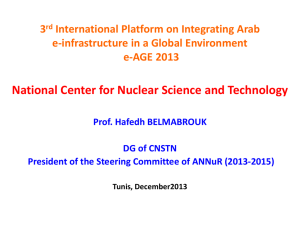

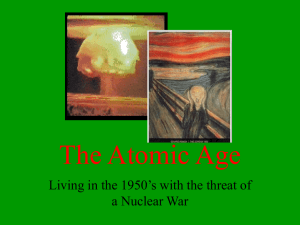

![The Politics of Protest [week 3]](http://s2.studylib.net/store/data/005229111_1-9491ac8e8d24cc184a2c9020ba192c97-300x300.png)


